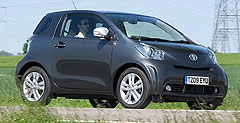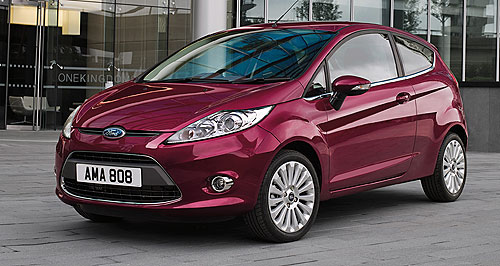News - General NewsBrits make big inroads into CO2 car emissionsGreat strides: UK new-car CO2 emissions have reached a new low, partly because of the nation's scrappage scheme last year. Average new-car CO2 emissions in UK fall 5.4 per cent to less than 150g/km15 Mar 2010 By TERRY MARTIN AVERAGE carbon dioxide (CO2) emissions from new passenger cars sold in the UK fell 5.4 per cent last year to 149 grams per kilometre – the biggest annual reduction the British market has ever achieved, and three times the average rate recorded since data was first measured in 1997. Back then, the average new-car CO2 emissions were more than 20 per cent higher, at 189.8g/km. In comparison, Australia recorded a national CO2 average of 197.5g/km for passenger cars last year, down from 201.7g/km in 2008. The UK’s peak industry body, the Society of Motor Manufacturers and Traders (SMMT), said last year’s CO2 reductions reflected the continued influence of technological advances made by vehicle manufacturers and came despite global car sales plummeting, plants cutting production and R&D budgets placed at considerable risk. It also said the combined effect of the recession in the UK and the government’s scrappage incentive scheme steered buyers towards more fuel-efficient models, which in turn influenced the lower CO2 average.  Left: Toyota iQ. Left: Toyota iQ.The average car bought under the scrappage scheme emitted 133g/km of CO2 – 26.8 per cent less than the CO2 of the average scrapped car. “Vehicle manufacturers have invested heavily in both improving conventional technologies and bringing advanced systems to market that reduce the environmental impact of new vehicles,” said SMMT chief executive Paul Everitt. “Whilst scrappage incentives made a positive contribution to fleet renewal in 2009, there is a risk that over the next few years, motorists may be deterred from investing in the latest technology. “Developing a long-term and consistent approach to vehicle taxation and environmental incentives will be important in maintaining the current rate of improvement.” Reductions in average emissions in the UK last year were made across all model segments, with sub-light cars and sportscars making the biggest improvement over 2008 with a fall of 6.7 per cent (to 115.6g/km) and 6.3 per cent (to 201.1g/km) respectively. Light cars came in at 131.9g/km (-4.2%), small cars at 147.4g/km (-4.1%), medium cars at 154.4g/km (-4.1%), executive/large cars at 177.1g/km (-4.7%), luxury cars at 250.3g/km (-6.0%), dual-purpose SUVs at 207.1g/km (-5.5%) and people-movers at 169.7g/km (-3.3%). By comparison, figures released by the Federal Chamber of Automotive Industries (FCAI) last month show that Australia – which still sells a high percentage of large cars, has fewer diesel models and does not have a fast-growing electric car industry – is still well behind the UK. Australian light cars were at 158.5g/km of CO2 at the end of last year (up 0.19% on 2008), small cars were at 182.1g/km (-1.2%), medium cars at 209.5g/km (-1.8%), large cars at 253.6g/km (-2.4%), upper-large cars at 283.7g/km (-4.7%), SUVs at 246.3g/km (-3.0%), people-movers at 246.2g/km (+1.0%), and sportscars at 218.4g/km (-4.5%). As GoAuto has reported, the European parliament passed legislation in December 2008 requiring all new passenger cars to reach 130g/km by 2015, with 65 per cent of all new cars reaching the target by 2012, 75 per cent by 2013 and 80 per cent by 2014. Major manufacturers exceeding the target will be heavily fined per additional gram of CO2 emitted, for every car registered across Europe and the UK. The figures released last week show that 27.6 per cent of passenger cars registered in the UK in 2009 emitted less than the 2015 target of 130g/km. The SMMT said the UK industry was well on its way to meeting the EU regulatory targets, although the current rate of improvement must be maintained. While economic factors might have contributed to the significant reductions in CO2 last year, the SMMT said that in the longer term “slower fleet renewal and a reduced willingness to invest in new technology may undermine this progress”. “Building consumer awareness and delivering effective mechanisms to influence buying behaviour through a long-term environmental tax regime and government’s recently announced ultra-low carbon incentive scheme, will become increasingly important,” the SMMT said. In a similar vein, the FCAI, which is negotiating a new CO2 target with the federal government, has emphasised the importance of taxpayer-funded incentives for consumers to purchase low-carbon vehicles, such as electric cars, hybrids and hi-tech ‘clean’ diesel models. The UK news came as Fiat posted Europe’s lowest volume-weighted CO2 emissions – an average of 127.8g/km – for the third year in succession, according to figures released by automotive advisory and research firm JATO. Fiat placed ahead of Toyota (130.1g/km), Peugeot (133.6g/km), Renault (137.5g/km), Citroen (137.9g/km), Ford (140.0g/km), Opel/Vauxhall (148.9g/km), Volkswagen (150.4g/km), Audi (160.9g/km) and Mercedes-Benz (176.4g/km).  Read more |
Click to shareGeneral News articlesResearch General News Motor industry news |
















Facebook Twitter Instagram